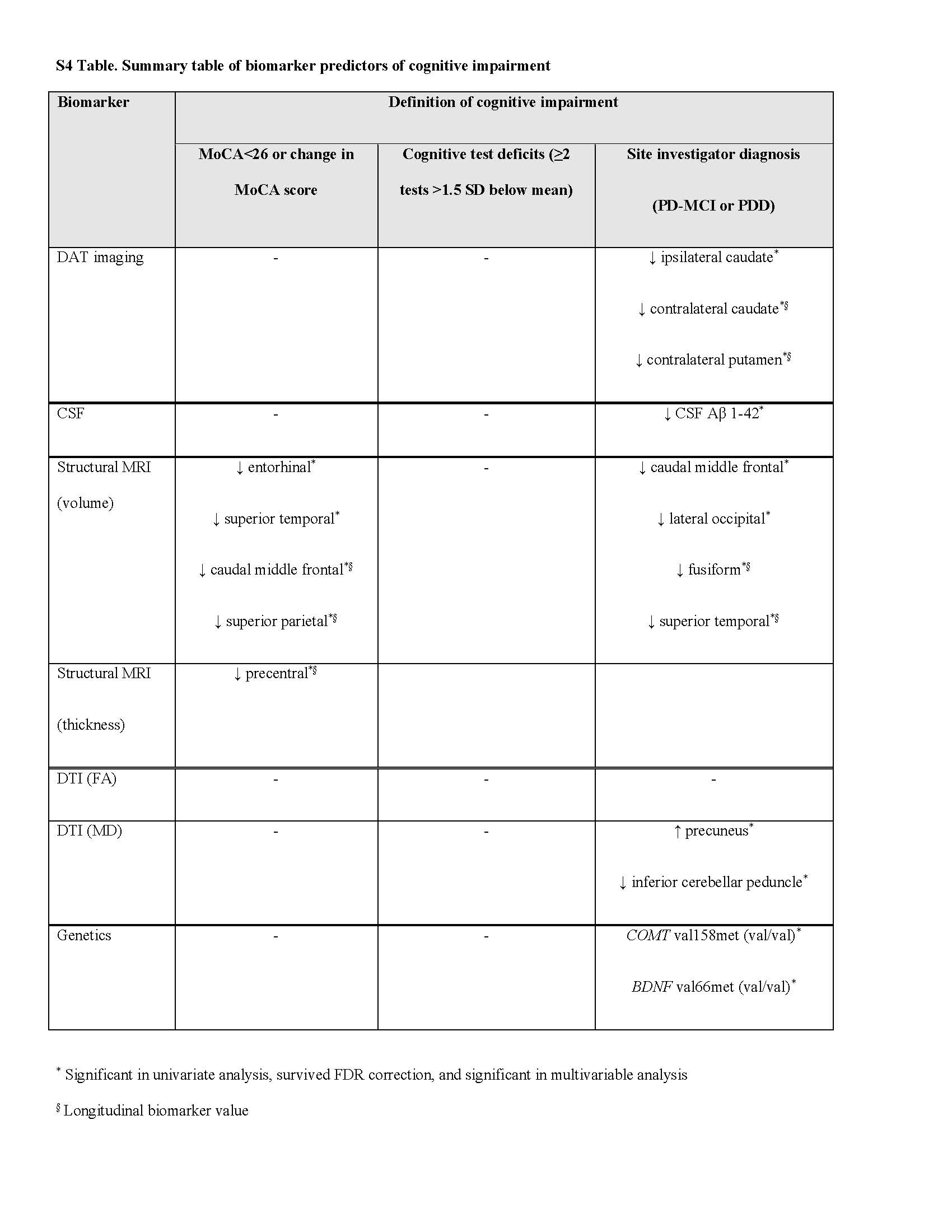Session Information
Date: Wednesday, June 7, 2017
Session Title: Cognitive Disorders
Session Time: 1:15pm-2:45pm
Location: Exhibit Hall C
Objective: To assess the neurobiological substrate of initial cognitive decline in Parkinson’s disease (PD) to inform patient management, clinical trial design, and development of treatments.
Background: The research on the neural substrates of the initial stages of cognitive decline in PD, starting with disease onset, are limited, with previous studies often characterized by single site participation, relatively small sample sizes, cross-sectional design, or a limited biomarker assessment.
Methods: We longitudinally assessed, up to 3 years, 423 newly diagnosed patients with idiopathic PD, untreated at baseline, from 33 international movement disorder centers. Study outcomes were four determinations of cognitive impairment or decline, and biomarker predictors were baseline dopamine transporter (DAT) single photon emission computed tomography (SPECT) scan, structural magnetic resonance imaging (MRI; volume and thickness), diffusion tensor imaging (mean diffusivity and fractional anisotropy), cerebrospinal fluid (CSF; amyloid beta [Aβ], tau and alpha synuclein), and 11 single nucleotide polymorphisms (SNPs) previously associated with PD cognition. Additionally, longitudinal structural MRI and DAT scan data were included. Univariate analyses were run initially, with false discovery rate =0.2, to select biomarker variables for inclusion in multivariable longitudinal mixed-effect models.
Results: By year 3, cognitive impairment was diagnosed in 15-38% participants depending on the criteria applied. Biomarkers, some longitudinal, predicting cognitive impairment in multivariable models were: (1) dopamine deficiency (decreased caudate and putamen DAT availability); (2) diffuse, cortical decreased brain volume or thickness (frontal, temporal, parietal, and occipital lobe regions); (3) co-morbid Alzheimer’s disease Aβ amyloid pathology (lower CSF Aβ 1-42); and (4) genes (COMT val/val and BDNF val/val genotypes).
Conclusions: Cognitive impairment in PD increases in frequency 50-200% in the first several years of disease, and is independently predicted by biomarker changes related to nigrostriatal or cortical dopaminergic deficits, global atrophy due to possible widespread effects of neurodegenerative disease, co-morbid Alzheimer’s disease plaque pathology, and genetic factors.
References: Marek K, Jennings D, Lasch S, Siderowf A, Tanner C, Simuni T, et al. The Parkinson Progression Marker Initiative (PPMI). Progress in Neurobiology. 2011;95:629-35.
To cite this abstract in AMA style:
D. Weintraub. Multiple modality biomarker prediction of cognitive impairment in prospectively followed de novo Parkinson disease [abstract]. Mov Disord. 2017; 32 (suppl 2). https://www.mdsabstracts.org/abstract/multiple-modality-biomarker-prediction-of-cognitive-impairment-in-prospectively-followed-de-novo-parkinson-disease/. Accessed April 21, 2025.« Back to 2017 International Congress
MDS Abstracts - https://www.mdsabstracts.org/abstract/multiple-modality-biomarker-prediction-of-cognitive-impairment-in-prospectively-followed-de-novo-parkinson-disease/

